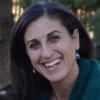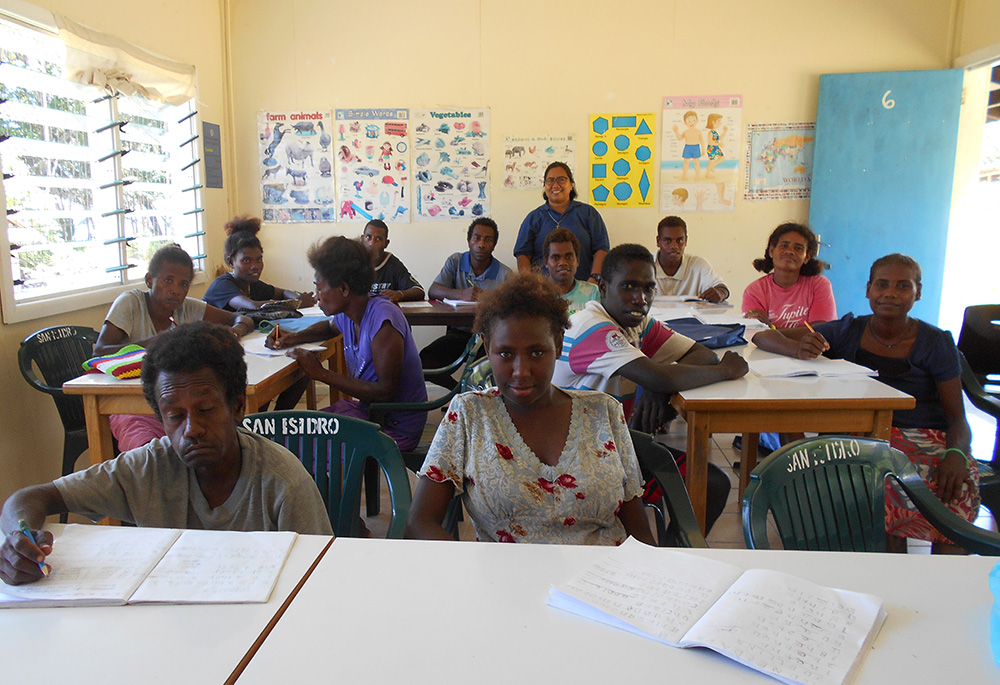
Sr. Maria Fe Rollo, standing in back, with her numeracy and literacy class in March 2018 at San Isidro Care Centre (Courtesy of Maria Fe Rollo)
Sr. Maria Fe Rollo has been a Missionary Sister of the Society of Mary for 15 years. Born in Davao City, Philippines, she joined the congregation when she was 36, drawn to its missionary charism of going out to the frontiers, proclaiming the Gospel inspired by and confident in Mary's help. She trained as a secondary teacher but has taught religious education in primary, secondary and tertiary settings, mostly in Davao City, Maitum, and General Santos City in the south of the Philippines.
In 2013, Sr. Georgeanne Marie Donovan, Fe Rollo's congregational leader at the time, asked her if she'd be willing to be sent to the Solomon Islands in the South Pacific to volunteer at San Isidro Care Centre, a school for people who are deaf. Fe Rollo took a month to pray and consider the request, and though she knew no sign language, said yes.
Located on the island of Guadalcanal, about 45 km (28 miles) northwest from the capital city of Honiara, San Isidro Care Centre was founded by the late Br. George van der Zant of the Society of Mary in 2007. It is a dedicated vocational training center for deaf students who travel from across the Solomon Islands to attend the boarding school. They range in age from 16 to 40, and though the students are mostly Catholic, it is open to anyone who is deaf. Since its beginning, about 180 students have graduated from the center.
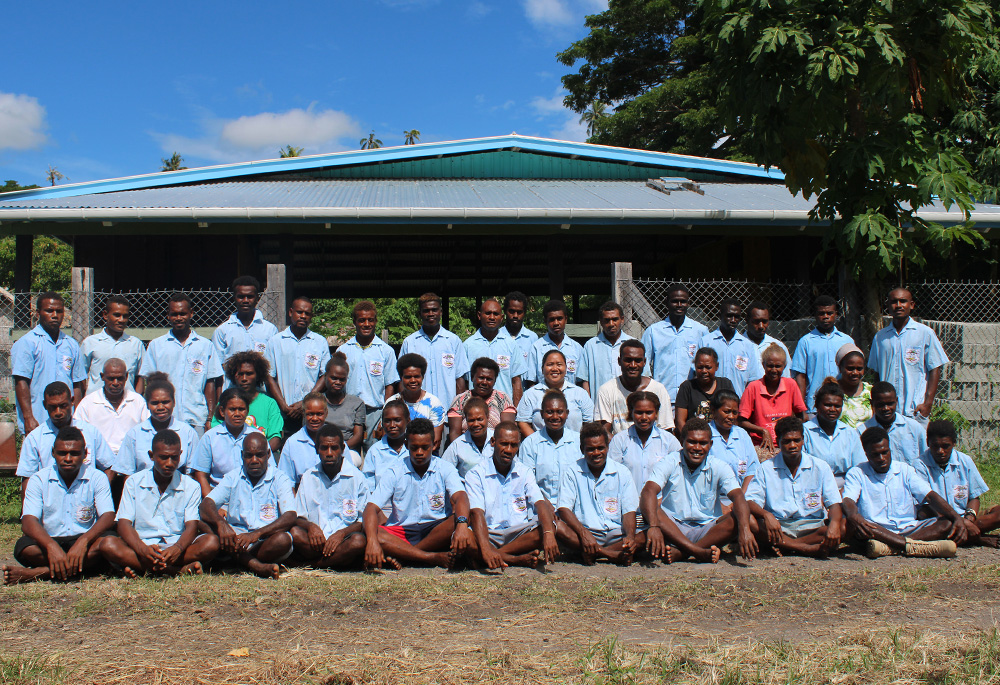
San Isidro Care Centre students and staff pose for a group photo in October 2021 outside the center's workshop. Sr. Maria Fe Rollo is seated, fifth from the right, in the middle row. (Courtesy of Maria Fe Rollo)
Fe Rollo arrived as a volunteer in 2014 to teach Christian education and five years later was appointed the principal of the center. Together with her staff of 10, including another sister from her congregation, Sr. Sonia Tulili from Vanuatu, the center provides basic literacy, numeracy, practical life skills training (including carpentry, sewing and handicraft, home economics), Christian formation and Auslan, Australian sign language. All of the teachers sign.
She is now the co-creator of a new project with Australian Catholic University and representatives of the Catholic Education Authority of the Archdiocese of Honiara to train 16 deaf and hearing people from across Solomon Islands in Auslan so they can travel to remote communities where deaf children and young adults and their families live.
The project has been funded through a research grant of close to $500,000 from the Education Sector Support Program Solomon Islands, a partnership between the governments of Solomon Islands, Australia and New Zealand. It is a project Fe Rollo hopes will help change and enhance the lives of her students, their families, and the broader Solomon Islands community.
Fe Rollo shared with Global Sisters Report how her missionary role as teacher and educator has also become one of student and champion for the deaf community of the Solomon Islands.
Advertisement
GSR: Before arriving at San Isidro Care Centre, had you any experience of sign language or working with deaf communities before?
Fe Rollo: In the Philippines during my teens, I learned the alphabet in American Sign Language. But when I arrived at San Isidro, that's when I discovered that sign language is a language by itself, and different countries have their own sign language, just like spoken language.
When I arrived in July 2014, I was observing and joined the class learning sign with the students. In February 2015, I started teaching Christian education classes with the help of an interpreter. I also volunteered to teach basic sign language for new students at that time.
It's been a big educational and eye-opening journey for me, entering the deaf community, another culture, teaching in this kind of situation where the students have special needs. The students too have become my teacher. Even to this day, I'm still learning, and I learn from the students. For instance, when I teach and don't know the word, I will ask the students, "What's the sign for this?" And they'll help me.
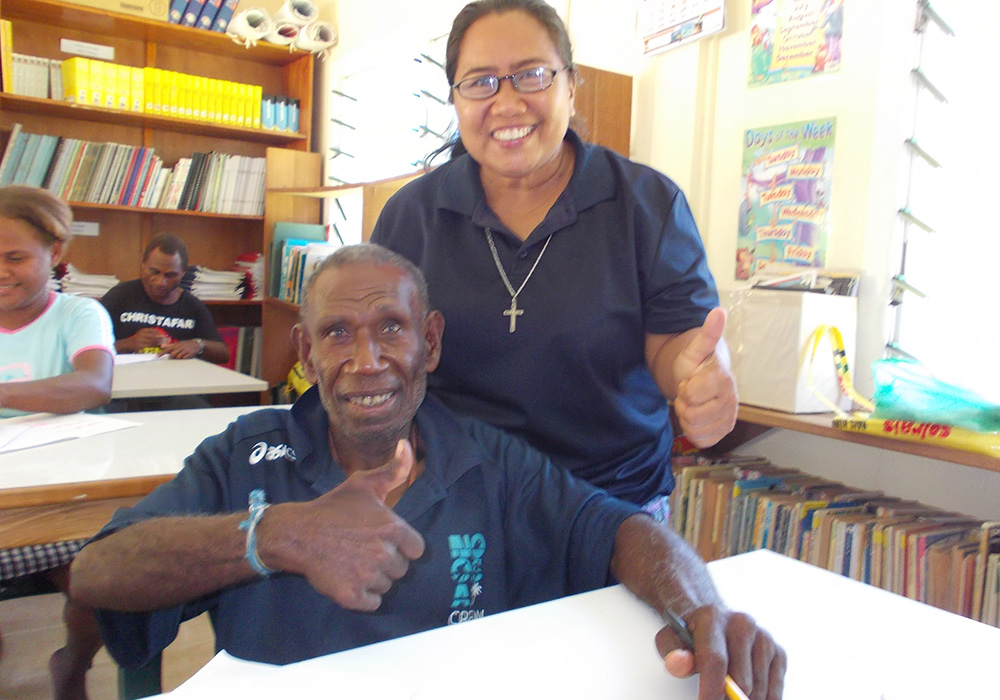
Sr. Maria Fe Rollo with Zach, San Isidro's eldest Year 2 student, in her sign language reading class at San Isidro Care Centre in August 2019. (Courtesy of Maria Fe Rollo)
How did the research project with Australian Catholic University and representatives of the Catholic Education Authority come about?
We'd been hearing stories from families of the students, saying, "Sister, we want to learn the language you're teaching the students in the school. It's good that they're learning the language there, but we can't communicate with them."
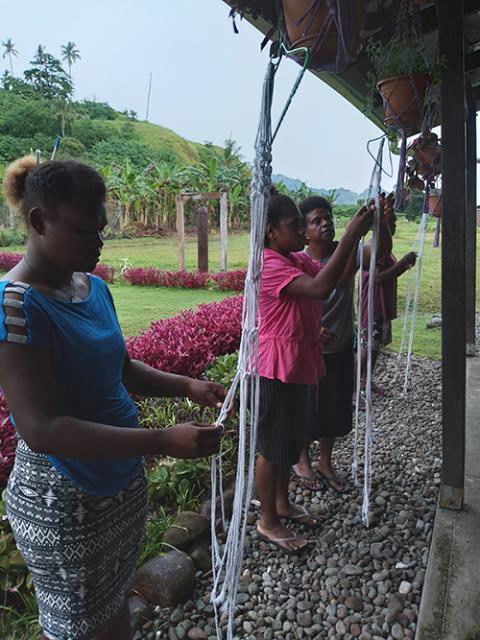
Students learn to weave macrame in Sr. Sonia Tulili's life skills class in September 2021 at San Isidore Care Centre. Tulili learned macrame from the fashion association in Honiara, the capital city of Solomon Islands. (Courtesy of Maria Fe Rollo)
Back at home, the students developed a sign language following the local dialect. This is different to what's taught at San Isidro. So when I started teaching here in 2014 as a volunteer and was in the process of learning basic Auslan, a lot of times, I couldn't get across to students because of the language barrier. I needed to call a staff member from where most of the students were from.
The problem is, when the students go home, the family doesn't know this new sign language that their children have been learning in the center. Or if the student is sick and needs to go to a health clinic back at home, they can't communicate. Or if our graduates are looking for a job or want to want to participate in political exercises locally, they can't communicate. So, there's a conflict and block there, and a lot of times, the students end up going back to their home sign language.
We heard a lot of these stories, and when we shared this with the Catholic Education Authority, Jackson Meke, who has been a supporter of Brother George from the beginning, he and his colleague, Dr. Mellita Jones from ACU, were able to help us germinate and grow the idea and develop it into this project.
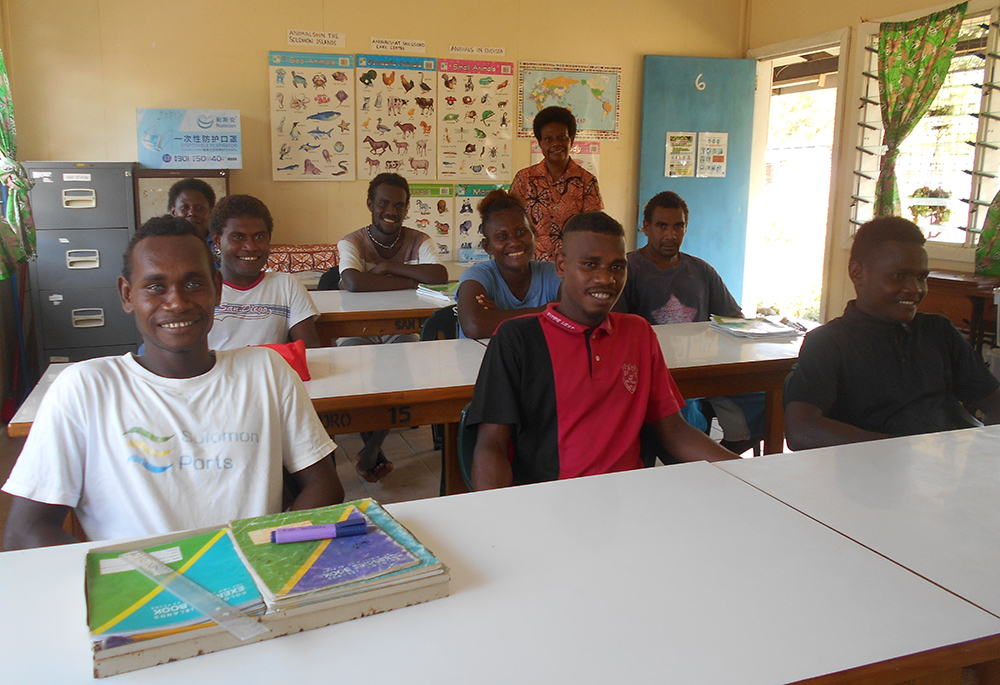
Sr. Sonia Tulili, standing in back, with her Year 3 and Year 4 literacy and numeracy class in October 2022 at San Isidro Care Centre. In the academic classes — sign language, mathematics, English, health, and Christian education — the students are mixed according to their capacity. (Courtesy of Maria Fe Rollo)
Why is this project so important to you?
It's a continuation of our support for the deaf students so that they can participate better in the life of their families and community as they go back. Our students learn so much from the center, so they'll be able to contribute when they go back home.
As a teacher, I learn so much from them, too, and I witness how they grow in terms of learning skills, growing in self-confidence and their sense of self and who they are. And so we feel a sense of responsibility that we continue our support of them as they go back to the family and to the community so that they can also share what they've learned and for the family and the community to help them build their lives, create their own families, and engage in economic activities that will help them and their family.
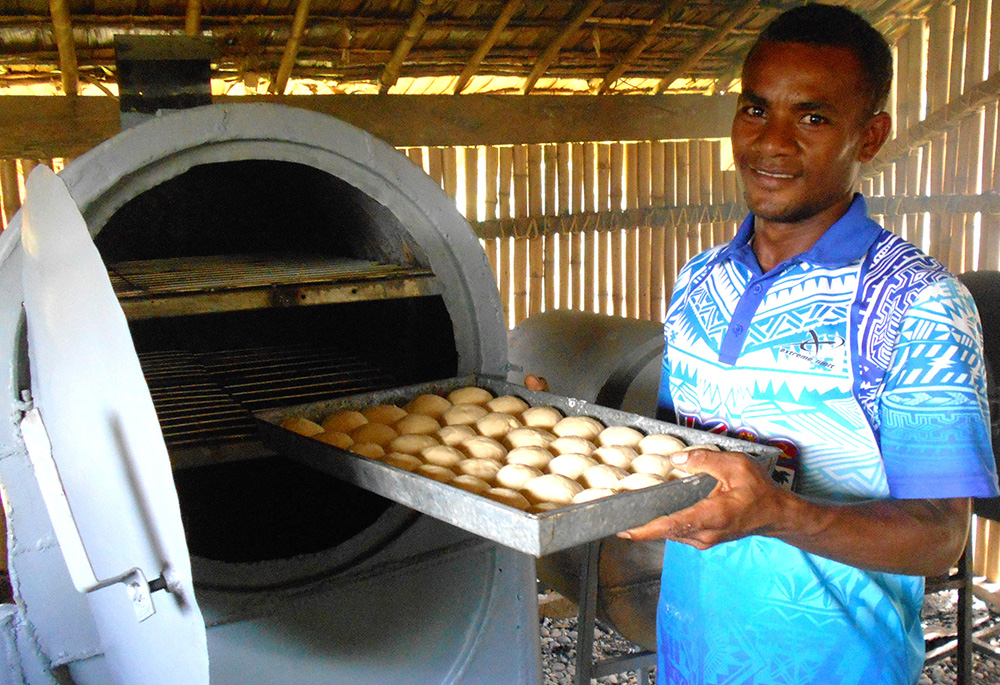
A student places a fresh batch of buns into the oven in October 2021 at San Isidro Care Centre. (Courtesy of Maria Fe Rollo)
It sounds like what you do at San Isidro is really changing the lives of your students.
Yes, yes, that's another way of saying it. We want to continue to contribute to affect their lives for the better.
When they come to the center, it's a different lifestyle than they experience at home in the use of sanitation and hygiene, and discipline is a fundamental value that we teach. We encourage them to be on time, to follow time, how to make use of the time and how to take responsibility in looking after each other, things of the school and in caring for the animals.
We hope when they go back to their families and community, they bring what they've learned at San Isidro with them with more confidence and can recreate it and that they can also effect change for the family and community. That's what Brother George, our late founder, would always say by way of encouraging them: "Always think of your future. We want to help you for the good of your future so you can have a better future." He always repeated that, and it's a legacy we are trying to continue and instill in every student that continues to come to San Isidro.
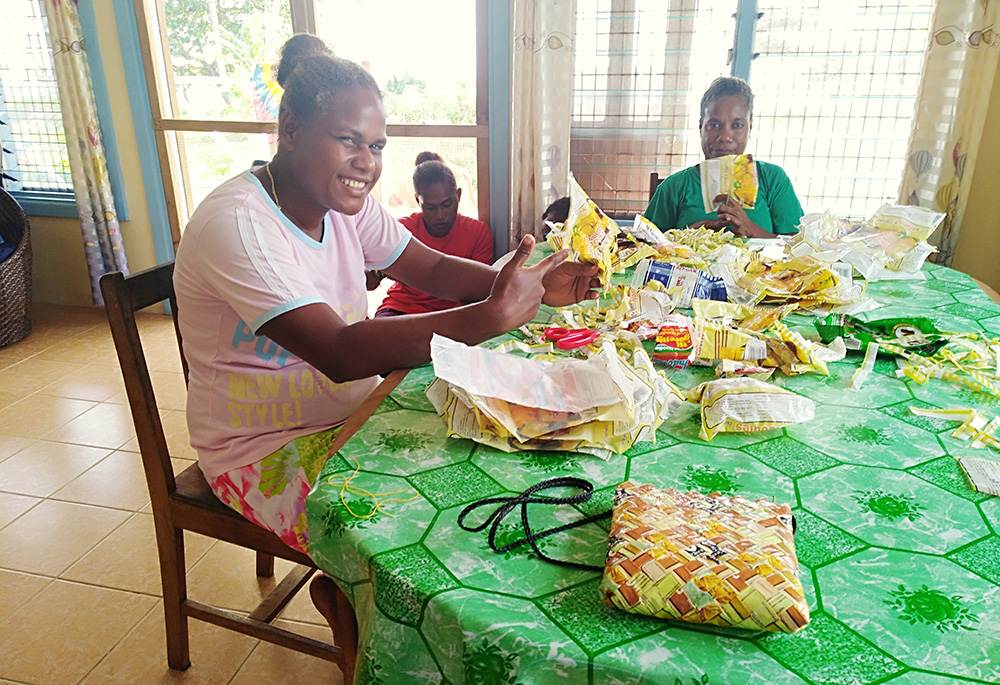
Students recycle plastic into handbags and coin purses in June 2021 at San Isidore Care Centre. (Courtesy of Maria Fe Rollo)
What have been some of the graces or highlights of your ministry?
I've been teaching for many years, and after my first profession as a Missionary Sister of the Society of Mary, I was missioned back to my home country [the Philippines], where I worked with school youth.
When I was asked to go on mission outside of my home country and to a deaf school, that was exciting for me. I was already a teacher and had a lot of experience in teaching, but when I entered San Isidro, I discovered as a missionary how important it is to remain open and to allow myself to keep learning because I'm entering a different community, a different culture — Solomon Islands culture — and then I'm entering another culture, which is a Solomon Islands deaf culture. So, there has been a lot of peeling-off in terms of what I already thought I knew.
It wasn't easy, but at the same time, I was hopeful because one thing I've discovered about myself in these eight years is that I'm always open to new possibilities, and that excites me.
When I see or meet the students, I say to them: "Each one of you has a lot of possibilities, good things that could happen with you." And, true enough, being with them makes me discover how each one is special and unique.
Over the years, I have had the beautiful opportunity to see each one grow, especially when they started to learn to sign, having come from a very far village to the center for the first time. For most of them, they learn faster when they mix with other students in the classroom. And when I see a new person learning to sign and coming out, the confidence starts to grow within them. And then when I see them starting to go up to the front of the class to lead the prayer or to sign a song, it's a wow moment for me every time.
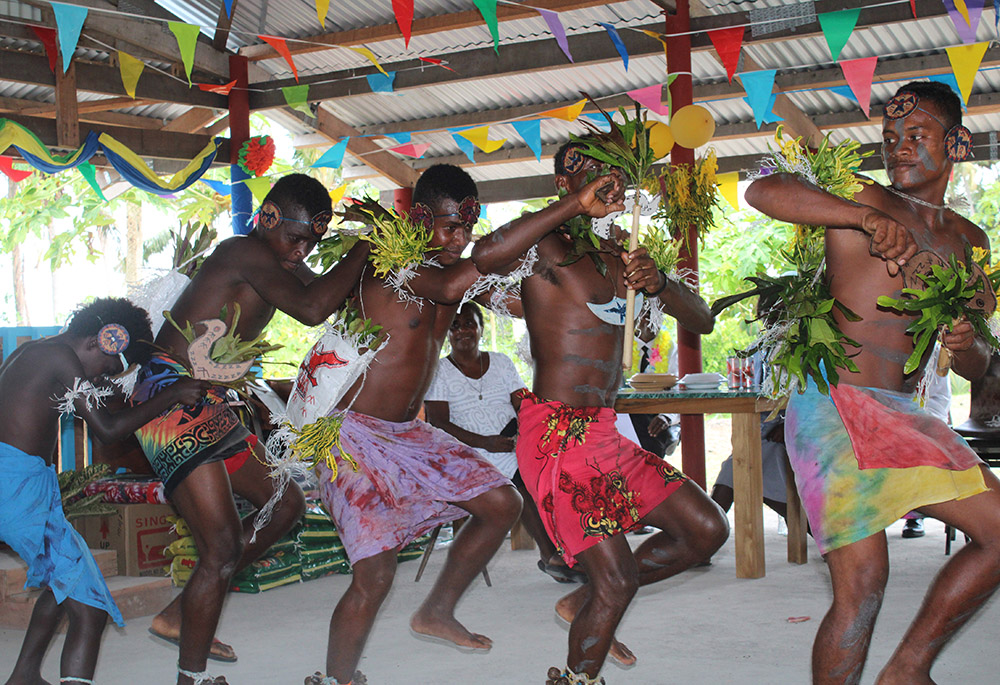
Students dance during the November 2021 graduation in the school community hall at San Isidro Centre. (Courtesy of Maria Fe Rollo)
What sustains and nourishes you in your ministry?
It's knowing that I'm helping and that it's not just my work. A lot of times, when I'm tired and I whine and think, "I could have just said no to all of this," I think, "But I can't." And then I start thinking about all the other possibilities and what more we can do to help.
Now, I'm trying to hatch another possibility with Caritas Australia of providing employment for our graduates and at the same time helping the center in its efforts for sustainability and self-reliance. We want to make use of our best graduates' skills in sewing, handicrafts, making furniture, and improving our small agribusiness.
What are you most grateful for?
I'm grateful that I am a Missionary Sister of the Society of Mary. If not, I would not have been sent to Solomon Islands and wouldn't have met these wonderful people, especially the students that I've lived and worked with since 2014, when I arrived there. I'm always grateful for that, for this journey, for the trust they've given me to be there on behalf of all our sisters and to help.
